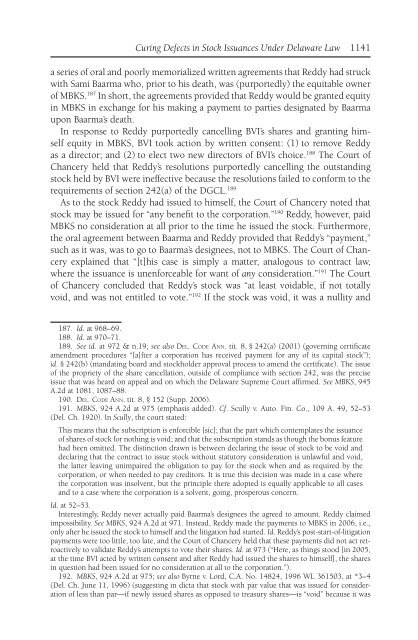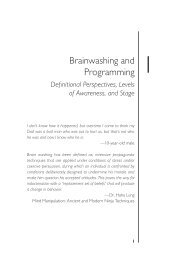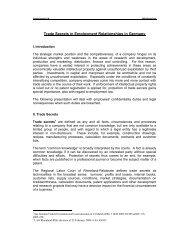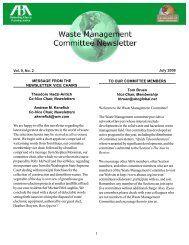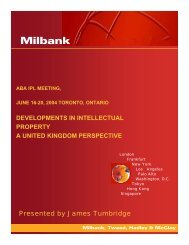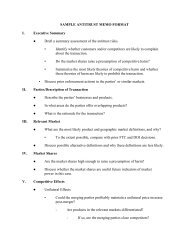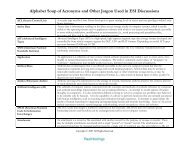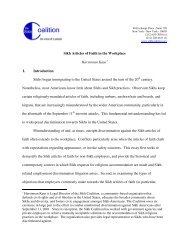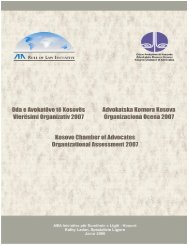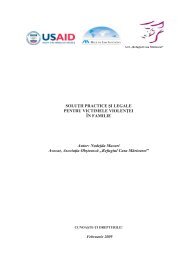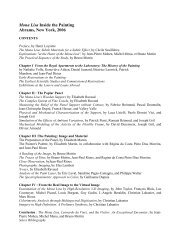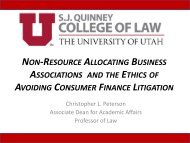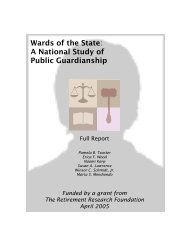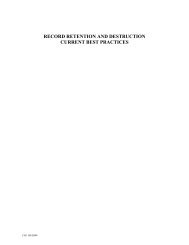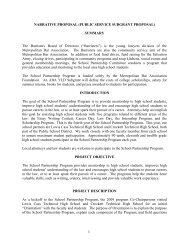Curing Defects in Stock Issuances - American Bar Association
Curing Defects in Stock Issuances - American Bar Association
Curing Defects in Stock Issuances - American Bar Association
Create successful ePaper yourself
Turn your PDF publications into a flip-book with our unique Google optimized e-Paper software.
<strong>Cur<strong>in</strong>g</strong> <strong>Defects</strong> <strong>in</strong> <strong>Stock</strong> <strong>Issuances</strong> Under Delaware Law 1141<br />
a series of oral and poorly memorialized written agreements that Reddy had struck<br />
with Sami Baarma who, prior to his death, was (purportedly) the equitable owner<br />
of MBKS. 187 In short, the agreements provided that Reddy would be granted equity<br />
<strong>in</strong> MBKS <strong>in</strong> exchange for his mak<strong>in</strong>g a payment to parties designated by Baarma<br />
upon Baarma’s death.<br />
In response to Reddy purportedly cancell<strong>in</strong>g BVI’s shares and grant<strong>in</strong>g himself<br />
equity <strong>in</strong> MBKS, BVI took action by written consent: (1) to remove Reddy<br />
as a director; and (2) to elect two new directors of BVI’s choice. 188 The Court of<br />
Chancery held that Reddy’s resolutions purportedly cancell<strong>in</strong>g the outstand<strong>in</strong>g<br />
stock held by BVI were <strong>in</strong>effective because the resolutions failed to conform to the<br />
requirements of section 242(a) of the DGCL. 189<br />
As to the stock Reddy had issued to himself, the Court of Chancery noted that<br />
stock may be issued for “any benefi t to the corporation.” 190 Reddy, however, paid<br />
MBKS no consideration at all prior to the time he issued the stock. Furthermore,<br />
the oral agreement between Baarma and Reddy provided that Reddy’s “payment,”<br />
such as it was, was to go to Baarma’s designees, not to MBKS. The Court of Chancery<br />
expla<strong>in</strong>ed that “[t]his case is simply a matter, analogous to contract law,<br />
where the issuance is unenforceable for want of any consideration.” 191 The Court<br />
of Chancery concluded that Reddy’s stock was “at least voidable, if not totally<br />
void, and was not entitled to vote.” 192 If the stock was void, it was a nullity and<br />
187. Id. at 968– 69.<br />
188. Id. at 970–71.<br />
189. See id. at 972 & n.19; see also DEL. CODE ANN. tit. 8, § 242(a) (2001) (govern<strong>in</strong>g certifi cate<br />
amendment procedures “[a]fter a corporation has received payment for any of its capital stock”);<br />
id. § 242(b) (mandat<strong>in</strong>g board and stockholder approval process to amend the certifi cate). The issue<br />
of the propriety of the share cancellation, outside of compliance with section 242, was the precise<br />
issue that was heard on appeal and on which the Delaware Supreme Court affi rmed. See MBKS, 945<br />
A.2d at 1081, 1087–88.<br />
190. DEL. CODE ANN. tit. 8, § 152 (Supp. 2006).<br />
191. MBKS, 924 A.2d at 975 (emphasis added). Cf. Scully v. Auto. F<strong>in</strong>. Co., 109 A. 49, 52–53<br />
(Del. Ch. 1920). In Scully, the court stated:<br />
This means that the subscription is enforcible [sic]; that the part which contemplates the issuance<br />
of shares of stock for noth<strong>in</strong>g is void; and that the subscription stands as though the bonus feature<br />
had been omitted. The dist<strong>in</strong>ction drawn is between declar<strong>in</strong>g the issue of stock to be void and<br />
declar<strong>in</strong>g that the contract to issue stock without statutory consideration is unlawful and void,<br />
the latter leav<strong>in</strong>g unimpaired the obligation to pay for the stock when and as required by the<br />
corporation, or when needed to pay creditors. It is true this decision was made <strong>in</strong> a case where<br />
the corporation was <strong>in</strong>solvent, but the pr<strong>in</strong>ciple there adopted is equally applicable to all cases<br />
and to a case where the corporation is a solvent, go<strong>in</strong>g, prosperous concern.<br />
Id. at 52–53.<br />
Interest<strong>in</strong>gly, Reddy never actually paid Baarma’s designees the agreed to amount. Reddy claimed<br />
impossibility. See MBKS, 924 A.2d at 971. Instead, Reddy made the payments to MBKS <strong>in</strong> 2006, i.e.,<br />
only after he issued the stock to himself and the litigation had started. Id. Reddy’s post-start-of-litigation<br />
payments were too little, too late, and the Court of Chancery held that these payments did not act retroactively<br />
to validate Reddy’s attempts to vote their shares. Id. at 973 (“Here, as th<strong>in</strong>gs stood [<strong>in</strong> 2005,<br />
at the time BVI acted by written consent and after Reddy had issued the shares to himself], the shares<br />
<strong>in</strong> question had been issued for no consideration at all to the corporation.”).<br />
192. MBKS, 924 A.2d at 975; see also Byrne v. Lord, C.A. No. 14824, 1996 WL 361503, at *3– 4<br />
(Del. Ch. June 11, 1996) (suggest<strong>in</strong>g <strong>in</strong> dicta that stock with par value that was issued for consideration<br />
of less than par—if newly issued shares as opposed to treasury shares—is “void” because it was


